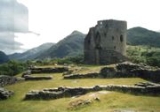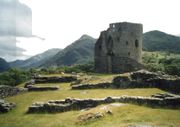
Owain Goch ap Gruffydd
Encyclopedia
Owain ap Gruffudd, (died 1282), was brother to Llywelyn the Last
and Dafydd ap Gruffudd and, for a brief period in the late 1240s and early 1250s, ruler of part of the Kingdom of Gwynedd
(in modern-day north Wales
).
and the grandson of Llywelyn the Great
. He was imprisoned together with his father in Criccieth Castle
in 1239 by his uncle Dafydd ap Llywelyn
, and accompanied his father to England
two years later when Dafydd was forced to hand Gruffudd over to King Henry III of England
. In 1244 Gruffudd was killed when a makeshift rope broke as he attempted to escape from the Tower of London
.
This freed Dafydd ap Llywelyn's hand as King Henry could no longer use Gruffudd against him, and war broke out between him and King Henry in the spring of 1244. Owain meanwhile had been freed by Henry after his father's death in the hope that he would start a civil war in Gwynedd, but he remained at Chester
, so that when Dafydd died unexpectedly in February 1246 without leaving an heir, his brother Llywelyn, who had supported his uncle against the king, had the advantage of being on the spot.
, which was divided between them. Gwynedd Is Conwy, east of the river, was taken over by the king. Though initially paying homage to the English, Owain and Llywelyn soon broke with Henry III in protest over the ruthless raids being conducted on the Welsh borders.
in June 1255. Llywelyn defeated Owain and Dafydd and captured them, thereby becoming sole ruler of Gwynedd Uwch Conwy.
(An artist's rendering of the battle)
The medieval Welsh chronicle Brut y Tywysogion
described the struggle thus:
. Owain was imprisoned again, and remained in prison until 1277.
 In a contemporary poem of the 13th century, court poet Hywel Foel ap Griffri laments Owain's captivity, describing him in the opening line as:
In a contemporary poem of the 13th century, court poet Hywel Foel ap Griffri laments Owain's captivity, describing him in the opening line as:
Gŵr ysydd yn nhŵr yn hir westai (a man who is in the tower, long a guest).
It is unclear where Owain was imprisoned, but some scholars believe he was kept in Dolbadarn Castle
near Llanberis
. Wherever he was kept, Llywelyn reluctantly released Owain in 1277 under the terms of the Treaty of Aberconwy
, after some 20 years of captivity.
Upon being released, Owain retired to his estate in north-west Wales and never again mounted a serious challenge to his brother Llywelyn's rule. He is thought to have died c. 1282.
Llywelyn the Last
Llywelyn ap Gruffydd or Llywelyn Ein Llyw Olaf , sometimes rendered as Llywelyn II, was the last prince of an independent Wales before its conquest by Edward I of England....
and Dafydd ap Gruffudd and, for a brief period in the late 1240s and early 1250s, ruler of part of the Kingdom of Gwynedd
Kingdom of Gwynedd
Gwynedd was one petty kingdom of several Welsh successor states which emerged in 5th-century post-Roman Britain in the Early Middle Ages, and later evolved into a principality during the High Middle Ages. It was based on the former Brythonic tribal lands of the Ordovices, Gangani, and the...
(in modern-day north Wales
Wales
Wales is a country that is part of the United Kingdom and the island of Great Britain, bordered by England to its east and the Atlantic Ocean and Irish Sea to its west. It has a population of three million, and a total area of 20,779 km²...
).
Lineage
Owain was the eldest son of Gruffudd ap LlywelynGruffydd ap Llywelyn Fawr
Gruffydd ap Llywelyn was the first born son of Llywelyn the Great . His mother Tangwystl probably died in childbirth.-Hostage:...
and the grandson of Llywelyn the Great
Llywelyn the Great
Llywelyn the Great , full name Llywelyn ab Iorwerth, was a Prince of Gwynedd in north Wales and eventually de facto ruler over most of Wales...
. He was imprisoned together with his father in Criccieth Castle
Criccieth Castle
Criccieth Castle is a native Welsh castle situated on the headland between two beaches in Criccieth, Gwynedd, in North Wales, on a rocky peninsula overlooking Tremadog Bay...
in 1239 by his uncle Dafydd ap Llywelyn
Dafydd ap Llywelyn
Dafydd ap Llywelyn was Prince of Gwynedd from 1240 to 1246. He was for a time recognised as Prince of Wales.- Descent :...
, and accompanied his father to England
England
England is a country that is part of the United Kingdom. It shares land borders with Scotland to the north and Wales to the west; the Irish Sea is to the north west, the Celtic Sea to the south west, with the North Sea to the east and the English Channel to the south separating it from continental...
two years later when Dafydd was forced to hand Gruffudd over to King Henry III of England
Henry III of England
Henry III was the son and successor of John as King of England, reigning for 56 years from 1216 until his death. His contemporaries knew him as Henry of Winchester. He was the first child king in England since the reign of Æthelred the Unready...
. In 1244 Gruffudd was killed when a makeshift rope broke as he attempted to escape from the Tower of London
Tower of London
Her Majesty's Royal Palace and Fortress, more commonly known as the Tower of London, is a historic castle on the north bank of the River Thames in central London, England. It lies within the London Borough of Tower Hamlets, separated from the eastern edge of the City of London by the open space...
.
This freed Dafydd ap Llywelyn's hand as King Henry could no longer use Gruffudd against him, and war broke out between him and King Henry in the spring of 1244. Owain meanwhile had been freed by Henry after his father's death in the hope that he would start a civil war in Gwynedd, but he remained at Chester
Chester
Chester is a city in Cheshire, England. Lying on the River Dee, close to the border with Wales, it is home to 77,040 inhabitants, and is the largest and most populous settlement of the wider unitary authority area of Cheshire West and Chester, which had a population of 328,100 according to the...
, so that when Dafydd died unexpectedly in February 1246 without leaving an heir, his brother Llywelyn, who had supported his uncle against the king, had the advantage of being on the spot.
Treaty of Woodstock
Owain and Llywelyn came to terms with King Henry, but were restricted by the terms of the Treaty of Woodstock in 1247 to Gwynedd Uwch Conwy, the part of Gwynedd west of the River ConwyRiver Conwy
The River Conwy is a river in north Wales. From its source to its discharge in Conwy Bay it is a little over long. "Conwy" is sometimes Anglicized as "Conway."...
, which was divided between them. Gwynedd Is Conwy, east of the river, was taken over by the king. Though initially paying homage to the English, Owain and Llywelyn soon broke with Henry III in protest over the ruthless raids being conducted on the Welsh borders.
The Battle of Bryn Derwin
The third brother, Dafydd ap Gruffudd, came of age soon afterwards, and King Henry accepted his homage and announced his intention of giving him a part of the already much reduced Gwynedd. Llywelyn refused to accept this, and Owain and Dafydd formed an alliance against him. This led to the Battle of Bryn DerwinBattle of Bryn Derwin
The Battle of Bryn Derwin was fought in Eifionydd in Gwynedd in June 1255, between Llywelyn ap Gruffudd and his brothers, Dafydd ap Gruffudd and Owain Goch ap Gruffydd....
in June 1255. Llywelyn defeated Owain and Dafydd and captured them, thereby becoming sole ruler of Gwynedd Uwch Conwy.
(An artist's rendering of the battle)
The medieval Welsh chronicle Brut y Tywysogion
Brut y Tywysogion
Brut y Tywysogion is one of the most important primary sources for Welsh history. It is an annalistic chronicle that serves as a continuation of Geoffrey of Monmouth’s Historia Regum Britanniae. Brut y Tywysogion has survived as several Welsh translations of an original Latin version, which has...
described the struggle thus:
In those days great strife was bred at the instigation of the Devil between the sons of Gruffudd ap Llywelyn, Namely Owain Goch and Dafydd on the one side, and Llywelyn on the other. And then Llywelyn and his men, trusting in God, awaited, unafraid on Bryn Derwin the fierce coming of his brothers, and a mighty host along with them. And before the end of one hour Owain Goch was captured and Dafydd fled, after many of his host had been slain.
Imprisonment and release
With his brothers out of the way, Llywelyn proceeded to extend Gwynedd's territory until it encompassed much of the rest of Wales, in the process claiming the title of Prince of WalesPrince of Wales
Prince of Wales is a title traditionally granted to the heir apparent to the reigning monarch of the United Kingdom of Great Britain and Northern Ireland and the 15 other independent Commonwealth realms...
. Owain was imprisoned again, and remained in prison until 1277.

Gŵr ysydd yn nhŵr yn hir westai (a man who is in the tower, long a guest).
It is unclear where Owain was imprisoned, but some scholars believe he was kept in Dolbadarn Castle
Dolbadarn Castle
Dolbadarn Castle is a fortification built by the Welsh prince Llywelyn the Great during the early 13th century, at the base of the Llanberis Pass, in North Wales. The castle was important both militarily and as a symbol of Llywelyn's power and authority. The castle features a large stone keep,...
near Llanberis
Llanberis
Llanberis is a village in Gwynedd, North Wales, lying on the southern banks of Llyn Padarn in Snowdonia. It takes its name from Saint Peris, an early Welsh saint.According to the United Kingdom Census 2001, the population of Llanberis was 1,954...
. Wherever he was kept, Llywelyn reluctantly released Owain in 1277 under the terms of the Treaty of Aberconwy
Treaty of Aberconwy
The Treaty of Aberconwy was signed in 1277 by King Edward I of England and Llewelyn the Last of modern-day Wales, who had fought each other on and off for years over control of the Welsh countryside...
, after some 20 years of captivity.
Upon being released, Owain retired to his estate in north-west Wales and never again mounted a serious challenge to his brother Llywelyn's rule. He is thought to have died c. 1282.

